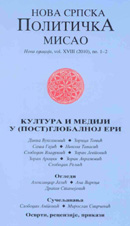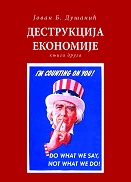
On January 20, 2008, Serbia held presidential elections. While it was expected that no one candidate would win enough votes in the first round (and there weren't surprises in how the first round votes were distributed among the candidates), the turnout was unexpectedly high—62 percent (4.1 million voters). This again demonstrated the high degree of interest in politics among Serbs and testifies to the democratic credentials of the country—it was a free and fair vote with all political forces represented.
The two candidates who will proceed to the second round are Tomislav Nikolić of the Serbian Radical Party (who received 39.99 percent of the votes) and Boris Tadić of the Democratic Party (who came in second with 35.4 percent). Both candidates tried to reach out to voters beyond their bases; this meant that both of them “changed places,” with Tadić sounding more like a “hardliner” while Nikolić tried to project a softer, more moderate image.
But regardless of who the new president of Serbia is going to be, neither of them can pursue policies that differ much. This means that Serbia cannot be either a NATO colony or a Russian province; neither candidate can turn his back on the Kosovo issue or on the European Union. The emphasis of both candidates during their campaigns that Serbia should turn to both the East and the West, and that they are willing to cooperate with both Europe and Russia, shows that the natural position of Serbia is actually between East and West.
The battle in the second round, on February 3, could result in an even higher turnout and will definitely have a more uncertain outcome. Foreign-policy issues are also likely to have an impact on the result. The signing of the Stabilization and Association Agreement with the EU has been announced for January 28. Whether the agreement is signed or not will influence the election returns. The signing of the agreement—if the Netherlands does not block it over issues related to the Hague tribunal—might increase Tadić's chances in the second round, but that is not so certain either. But the agreement with the EU could be a very vulnerable issue if it is perceived that Tadić is “exchanging” Kosovo for Europe, so it would be actually better for Tadić if its signing were postponed. On the other hand, Tadić could gain votes by endorsing the deal with Russia's Gazprom to purchase a controlling stake in NIS (Serbian Oil Industry), since to win he needs to attract voters from both sides of the political spectrum.
What remains to be seen is whether Tadić will return to the rhetoric that marked the beginning of the campaign—that the run-off is a decisive choice between continuing on the path of integration with Europe versus “self-isolation” offered by the Radicals, and whether Nikolić will harden his rhetoric on no compromise over Kosovo and increasing cooperation with Russia. This, however, could result in a renewal of polarization in Serbia, after which Serbia is going to be everything but stable and strong. No one could actually benefit from the Manichean “either-or” attitude, especially the citizens of Serbia. This could be even more dangerous in the circumstances where the margin of victory in the run-off could easily be thin and disputable.
If, however, the leading candidates continue their tactic of “changing places,” that could be not just a winning option for either of them (as taking on the role of unification and compromise), but far more significantly, a path toward long-term stability and democratic pluralism. This will be achieved if, regardless of the outcome of presidential elections, institutions continue to function and each side recognizes that the choice is not “for” and “against” Europe, “for” or “against” Kosovo and and “for” or “against” Russia. Instead, that path lies in Serbia charting a balanced course between East and West. This lays the basis for a consensus approach and strengthens Serbian democracy.
Bogdana Koljević is a political philosopher and researcher at the Institute for Political Studies in Belgrade and a member of the editorial board of Nova srpska politička misao (New Serbian Political Thought), a journal for political theory and social analyses.




.jpg)








 On January 20, 2008, Serbia held presidential elections. While it was expected that no one candidate would win enough votes in the first round (and there weren't surprises in how the first round votes were distributed among the candidates), the turnout was unexpectedly high—62 percent (4.1 million voters). This again demonstrated the high degree of interest in politics among Serbs and testifies to the democratic credentials of the country—it was a free and fair vote with all political forces represented.
On January 20, 2008, Serbia held presidential elections. While it was expected that no one candidate would win enough votes in the first round (and there weren't surprises in how the first round votes were distributed among the candidates), the turnout was unexpectedly high—62 percent (4.1 million voters). This again demonstrated the high degree of interest in politics among Serbs and testifies to the democratic credentials of the country—it was a free and fair vote with all political forces represented. 











